Science Policy Group Seeks to Foster Careers in, Educate About, and Advocate for Science Policy
“We are only as powerful as the people that decide to join.” – Libby Haywood, MCB Graduate Student and Chair of the SPG Professional Development Committee
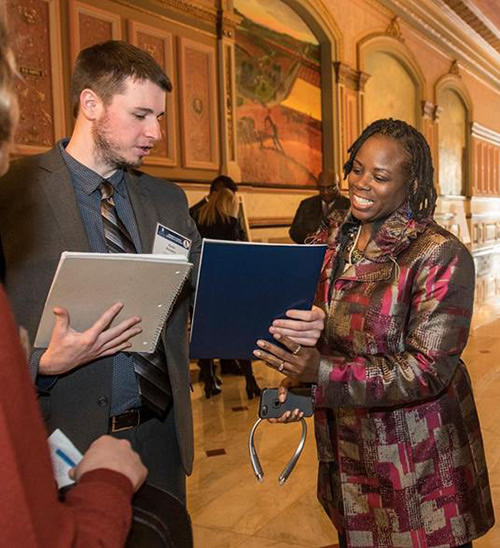
Ryan Rooney, the Science Policy Group's treasurer, speaks to State Representative Carol Ammons during his visit to the state capitol. (Photo courtesy of: Science Policy Group website.)
June 9, 2017
While the Science Policy Group, which began in January of 2017, might be the new kids on the block when it comes to RSOs (Registered Student Organizations), they’re not hesitant to tackle some weighty subjects, like diversity in STEM or President Trump’s impact on science education. Their latest coup? They’ve invited Illinois State Senator Scott Bennett to drop by campus to participate in a dialog about Science Policy at 4:00 pm on July 13, 2017, at Beckman Auditorium...and invite everyone to attend.
According to Libby Haywood, a 4th year Microbiology grad student and chair of the Professional Development Committee, the goal of the Science Policy Group (SPG) is to:
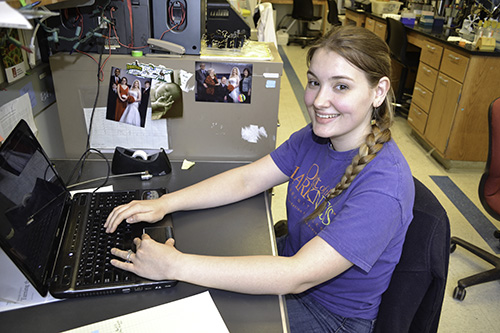
Libby Haywood, chair of SPG's Professional Development Committee.
“Educate and help inform graduate students to get involved in science policy, informing them about what it is, giving them tools to become involved and to pursue it as a career. Also, if they want to be an advocate and not pursue it as a career, we have those avenues too. We’re creating these resources for ourselves, just as much as for other people. We’re trying to create a group that can do it.”
The group's three commitees and the areas they seek to impact include:
- Inform (inform people about what science policy is)
- Advocacy (advocate for change in science policies)
- Professional Development (equip students with skills to affect change)
Haywood elaborates on the committees’ duties: “Our Inform Committee brings speakers in and organizes events like the diversity event where people have this space to talk and discuss ideas or how their work affects policy. So that’s education in itself—sitting and talking. Advocacy is going and doing and also educating people on how to do that well. Professional Development is what you need to do to have a career in science policy.”
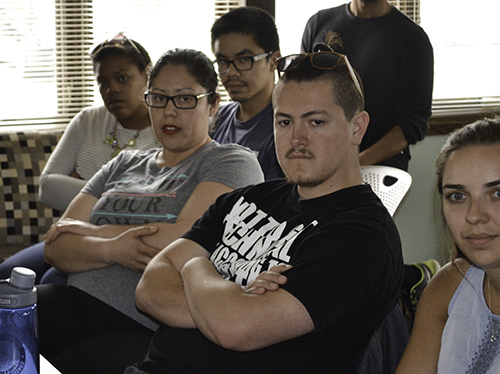
Graduate students on hand to participate in the dialogue on diversity in STEM at the SPG's Brown Bag Lunch: Diversity Initiatives in STEM in April 2017.
Regarding the group’s current membership, around 25–30 students serve on the committees and the e-board. According to Ryan Rooney, the RSO’s treasurer, they’re
“the people in the trenches…organizing events, recruiting people, doing all that kind of more intense work.” In addition, their listserv reaches about 150–200 people.
Haywood helped found the Science Policy Group because she has “a big interest in science policy and how the research we do in the lab communicates to the public.”
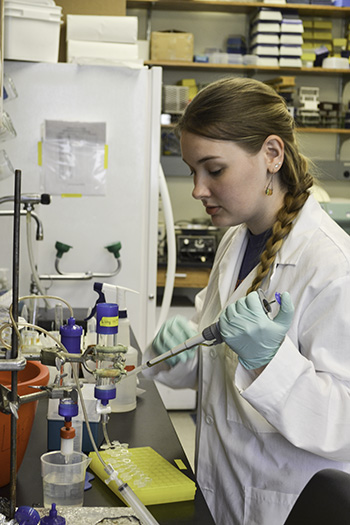
Libby Haywood working with proteins in Dr. Brenda Wilson's lab in CLSL.
Haywood works in Dr. Brenda Wilson’s lab researching AB type toxins—proteins produced by pathogenic bacteria that, according to Haywood, “can then get inside the host cell to do a lot of bad stuff. So we want to utilize their delivery mechanism to deliver the good stuff and the therapeutic drugs.”
While her career goals are “very open right now,” she likes education and wants to be a professor in a liberal arts school.
Haywood indicates that throughout her grad career, she’s been looking for a student group that would enable her to develop professionally and yet leave her mark:
“I didn’t just want to be in a club and go to mixers,” she admits. “We want to build something. This is what I’ve been waiting for—a chance to build something that we can leave here that helps our own development.”
Rooney also wanted to be involved in a group with a little more substance. “I’m not big on social media,” he says, “but that seems to be the outlet that a lot of people go to for this type of involvement. I wanted something a little more tangible to be involved in.”
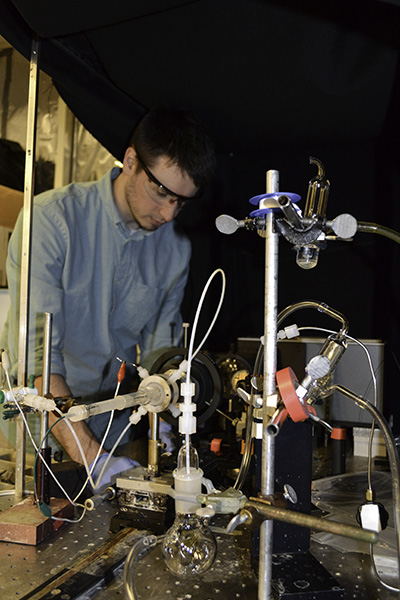
Rooney researching copper electrodeposition in his lab.
A 3rd year chemistry student, Rooney works in Professor Andrew Gewirth’s lab dealing with electrochemistry issues: battery work and fuel cell reactions. His own work in copper electrodeposition is the process used to make circuit boards and integrated circuits. “Anything that has a microchip has a bunch of tiny electrical connections in there, so you can have your currents running and do your computing,” he explains.
He also hopes the group helps him develop career wise. “I came to grad school pretty sure already that I didn’t want to be a professor, but I didn’t know what that meant in terms of other career options that are out there. I think this is another step, personally, in exploring what else can be a career long term.”
Rooney’s career mindset is another reason they began the group: “Sometimes students that don’t want to be in academia or industry tend to feel that they get overlooked,” Haywood admits.
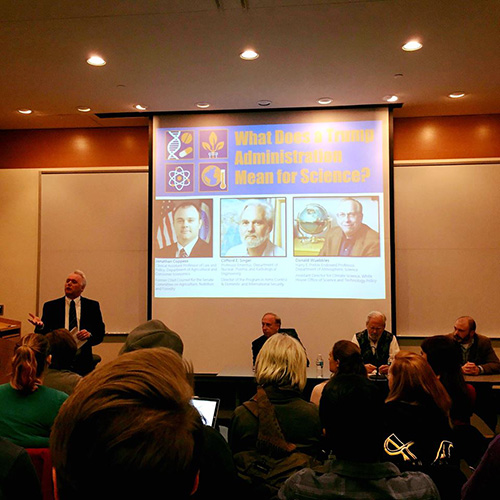
Image of the “What does the Trump Administration Mean for Science?” panel. (Photo courtesy of: Science Policy Group website.)
The group’s inaugural event was a standing-room-only panel, “What does the Trump Administration Mean for Science?” held on January 21, 2017, which Haywood says was “great to announce who we are…That was really successful I think in getting our name out there as a group and recruiting more people.”
At another event, C.A.R.D. (Call-A-Representative Day) held at the Illini Union on April 10, “people could come in and search for their representatives based on their zip code and call them up and tell them how they feel," Haywood explains.
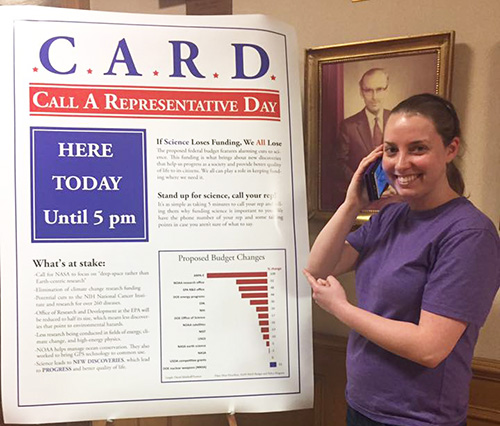
An SPG member encourages visitors to participate in "Call-A-Representative Day—to call up their representative and tell them how they feel...especially about science policy issues. (Photo courtesy of the Science Policy Group website.)
"Calling’s more effective than writing,” she adds, “and showing up to their office is more effective than calling. The consensus is, they work for you.”
As an example of the group’s advocacy arm, Rooney participated in the “Student Day at the Capitol” on March 29, 2017. Students from all three Illinois campuses bussed to Springfield to attend impromptu meetings with state representatives and senators at the capitol building. This year’s emphasis? “Funding, funding, funding,” Rooney says.
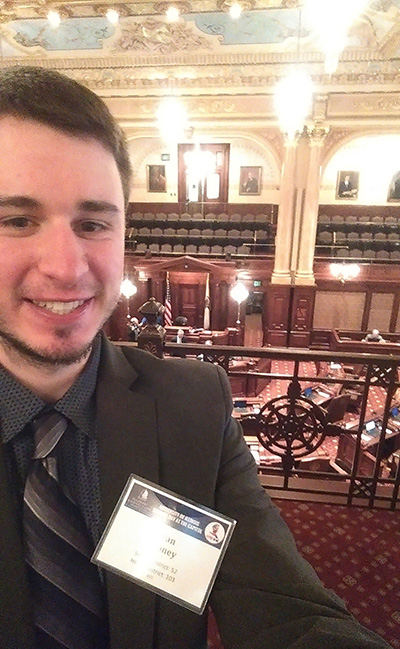 Rooney gets a selfie at the Capitol Building. (Photo courtesy of Ryan Rooney.)
Rooney gets a selfie at the Capitol Building. (Photo courtesy of Ryan Rooney.)While in Springfield, he met with Scott Bennett. “He was all on board,” Rooney admits. (As well he should be; Bennett wrote the bill for the U of I funding that the General Assembly has been considering.) Rooney also met with Carol Ammons, who was “all for it too. So I kind of had an easy job that day, not really having to convince anyone too much. It was an awesome experience; they were more receptive to students than I thought representatives would be. They’re people too, we’re constituents that vote, so that was a very valuable experience.”
Rooney hopes that in the future, the SPG can take some students to Springfield and even Washington DC. “We’re not there yet in terms of our group,” he acknowledges, “and funding and sending people and travel costs, but hopefully in years to come we can participate in events like that.”
However, the group was able to arrange for Scott Bennett to visit campus: “We’ve been wanting to get a local legislator to come and talk about science policy and how it effects their job,” he says.
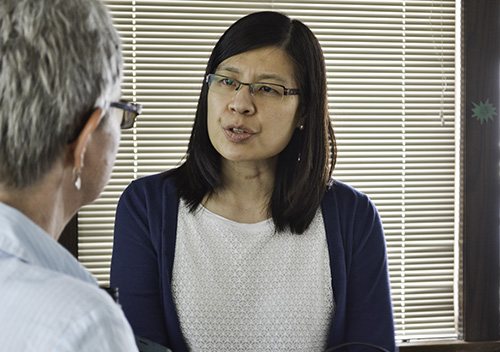 Ellen Wang Althaus, Director of Graduate Diversity in the Chemistry Department, chats with a brown bag luncheon participant following the meeting.
Ellen Wang Althaus, Director of Graduate Diversity in the Chemistry Department, chats with a brown bag luncheon participant following the meeting.Another well-attended event that fostered dialogue about diversity in science was SPG's Brown Bag Lunch: Diversity Initiatives in STEM, held on April 19, 2017. While the luncheon featured two speakers well-versed in fostering diversity in STEM, Ellen Wang Althaus, Director of Graduate Diversity in the Chemistry Department, and Jennifer Greene, a Professor in Educational Psychology who has experience in evaluating NSF programs that broaden participation of minorities, the other participants also got opportunity to share about their personal experiences related to diversity in STEM.
Regarding its third emphasis, Professional Development, Haywood’s committee seeks to “educate graduate students who want to go into a science-policy-related career on how they can do that. We’re trying to create those sort of avenues.”
She hopes to eventually create a boot camp and a long-term certification program “so people can take classes and learn about policy and what it means.” So they’re compiling a list of relevant science policy classes in order to “create a cohesive program that any student could take and get a certificate in Science Policy. We want to create a workshop, a weekend or weeklong event where we get to touch on these. People from all these different departments come together and use that to springboard into the certificate at the university level.”
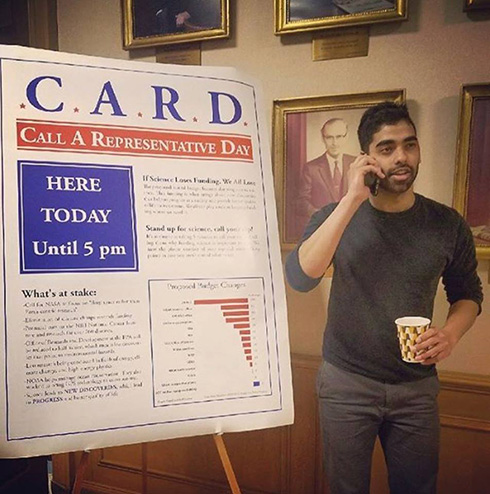 At the "Call-A-Representative-Day" event, SPG president Sudharsan "Suds" Dwaraknath was on hand to encourage folks to search for their representative and call them to tell them how they feel.
At the "Call-A-Representative-Day" event, SPG president Sudharsan "Suds" Dwaraknath was on hand to encourage folks to search for their representative and call them to tell them how they feel.The SPG also hopes to facilitate submissions to journals in science policy and government, “so people can write about science policy that are interested in making those connections,” she adds.
Though the SPG is still small and can’t yet achieve all that they envision, that hasn’t stopped them both from dreaming. “We’re creating all of these avenues and ideas,” she explains. “As soon as we have one event, five more ideas pop up. We’re trying to build our membership base so we have the man power to make all of this stuff happen.”
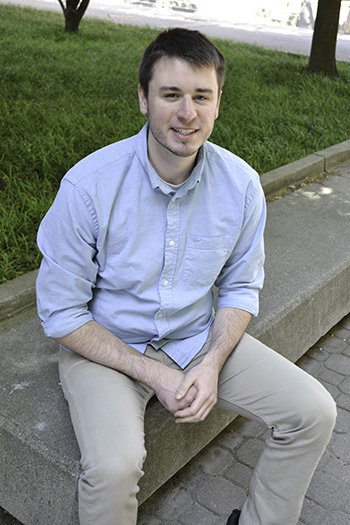 SPG treasurer Ryan Rooney.
SPG treasurer Ryan Rooney.One area about science policy that Rooney would like to change is involvement: “A lot of people become disconnected with legislation and government. If we can help people find a new avenue to get reconnected, I think that would have a big impact. When people do show up, their voices are heard. It’s not because people ignore voices; it’s because the voices aren’t there in the first place. Once you’re involved, you will be informed. That’s where science policy is huge. Being informed and having the right information to make the best decision.”
So to help people get informed, the SPG is planning a couple of workshops. For example, they're working with the Office of External Fellowships to create a Science Policy Fellowship Workshop that is tentatively scheduled to take place in late July.
In another effort to get people informed, a Science Policy Workshop is slated for the fall. The idea is to provide lectures and workshops where grad students can learn skills that can be translated into careers in science policy. The group received a $2500 grant from the Student Sustainability Committee to pay for advertising, materials, and speakers. Their target date is mid to late September, “when students are back,” Rooney says. “New semester—people are excited.”
Also beginning in the fall is a reading group about intersectionality within science policy and intersectionality’s importance in informing science policy. The brain child of SPG member, David Stevens, the reading group would be a sort of sister program that the group would support.
To help fund their science-policy-related visions, Treasurer Rooney announces the big fundraising strategy they’re about to roll out. To get institutional departmental support, they intend to contact the departments of the group’s students, saying, “‘This group matters to your students. It will help their careers. It will help them be better students, and you should help contribute to expanding our events.’ The next step is to get sponsored events.”
Continually seeking to grow their group’s membership, Haywood extends one final recruiting plea: “We are only as powerful as the people that decide to join. We really encourage people to come and give up as much of their time as they can. I always tell my committee members to lean in when you have time and lean out when you don’t. Just because you’re busy now, doesn’t mean you’ll be busy forever.”
Story and photographs (unless noted otherwise) by Elizabeth Innes, Communications Specialist, I-STEM Education Initiative.
Other I-STEM articles about the Science Policy Group:
More: Underserved Students/Minorities in STEM, 2017
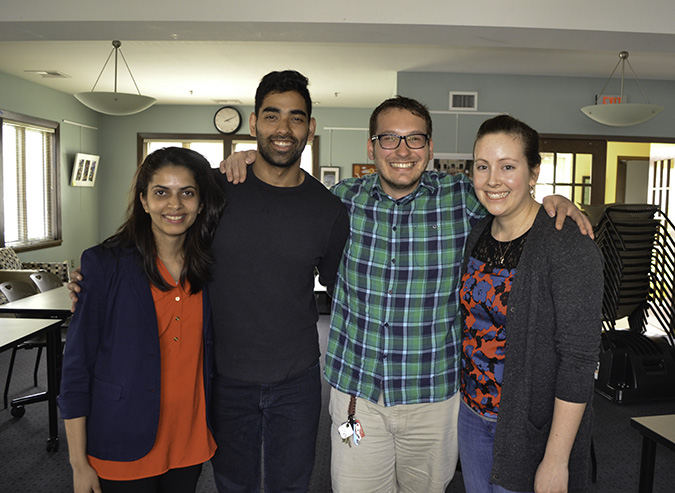
Left to right: Several members of the Science Policy Group: Aastha Sharma, SPG president Sudharsan "Suds" Dwaraknath, David Stevens, and SPG vice president Courtney Ford.













.jpg)
















